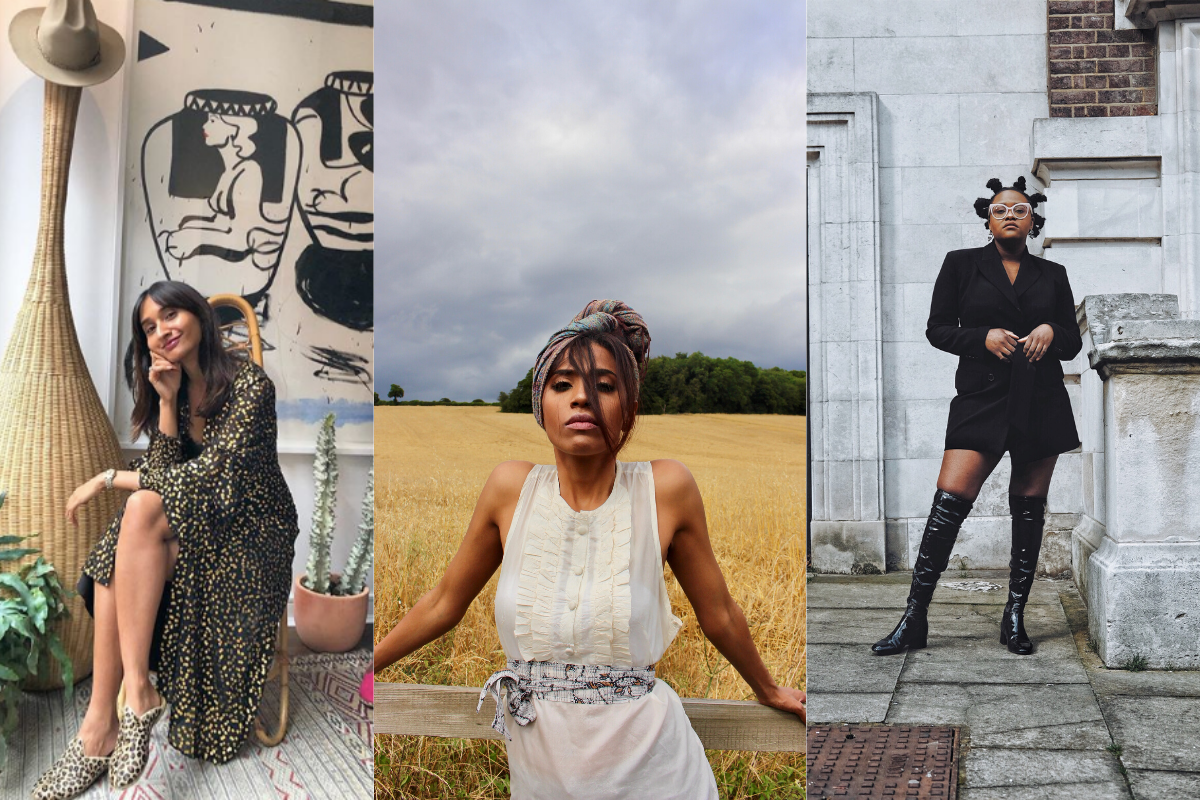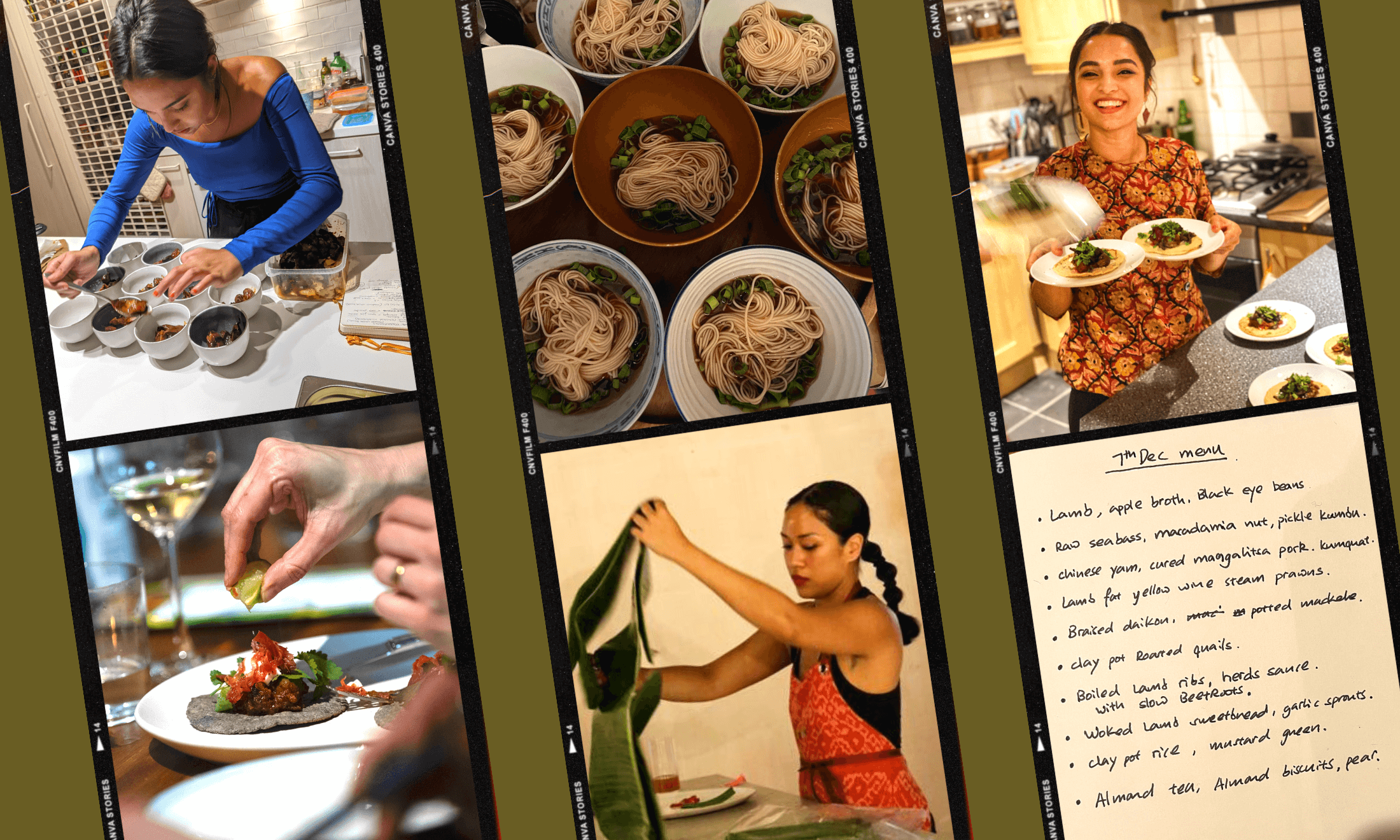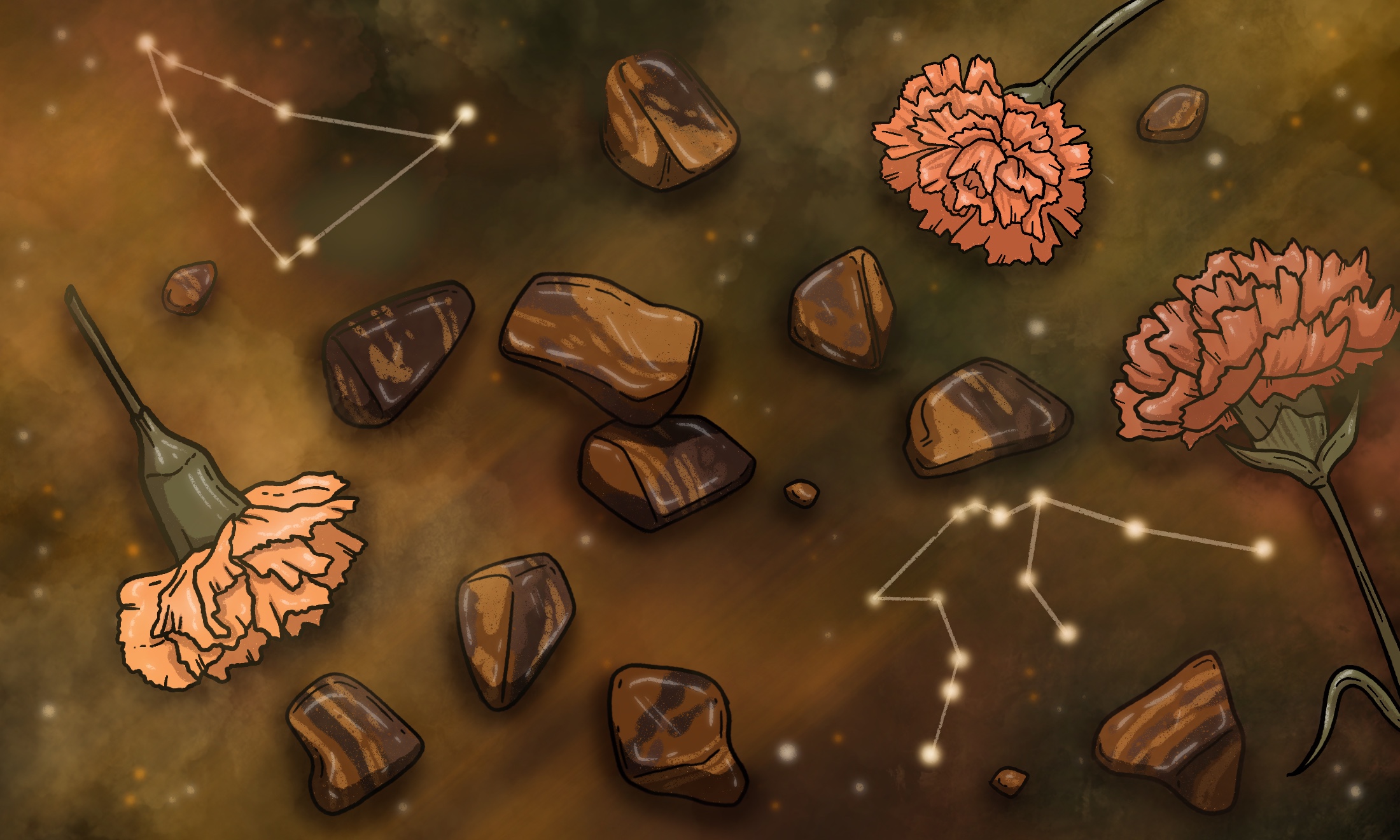
Photography via arentyoueshita , Pierre Papet, and Ngoni Chikwenengere
“Don’t wear the same outfit twice! Especially if it’s been on Instagram.” A casual narrative we tell ourselves as a generation, whilst around £140 million worth of clothing goes to landfills every year in the UK – most are in wearable condition. At the same time, we’ve seen an uproar in the need for slow fashion and conscious fashionistas. I recently stood in awe at the #PostiveFashion exhibition at London Fashion Week, which displayed work from UK designers who are opening up conversations on zero waste and diversity, amongst other fashion industry issues.
Outside the fashion world, I found myself surrounded by friends and family who saw slow fashion as an expensive hobby for white middle-class people to engage in. For anyone wondering how you’d define slow fashion, it’s the movement of designing, creating, and buying garments for quality and longevity. Even though there are people of colour with large audiences and influence such as Aja Barbar, Emma Slade and Shopé Delano that are repping the slow fashion movement, I began to wonder if the voices of black and brown people were hidden.
My personal journey into slow fashion started as a means to save money by buying less items. This year, my platform, The Fabric Swatch, which upcycles unused fabric and scraps from manufacturers in London, was shortlisted for a Sustainable City Award. I couldn’t ignore the brutal working conditions of machine workers in other continents creating endless garments for our Western pleasures while working in disgusting conditions with minimal safety and security.
“I have to admit, this isn’t a process that took place over night. My early twenties were shaped a lot more by materialism and a desire for status pieces”
Anusha Couttigane, fashion and jewellery analyst
Fast fashion is inexpensive clothing produced rapidly by mass-market retailers, and it’s our issue to fix it. Currently, East Africa is preparing to become a global powerhouse for fashion manufacturing because, for the first time, Ethiopia and Tunisia appear in the McKinsey report of top 10 sources for clothing manufacturing globally.
Luckily, there’s a growing number of people of colour in the UK who have chosen slow fashion as a lifestyle, and each of them breaks down a few myths associated with being into sustainable fashion.
Since being listed as one of Drapers’ 30 Under 30 rising stars of the fashion industry in 2018, Anusha Couttigane felt that she had a responsibility to use her influence to help fashion brands do better with their sustainable and ethical practices. “I’ve been working in fashion for 10 years,” she says. “The year I became a fashion consultant was the year of the Rana Plaza collapse in Bangladesh, so this event has always shaped my perspective of the fashion industry.”
Each year, Anusha writes a report on the progress retailers are making towards being more sustainable. Although the industry is a huge polluter, it’s also a huge employer and an incredibly powerful social tool for self-expression, art, and politics. The UK’s Fashion industry is worth £26 billion and creates 800,000 jobs to the economy, making it the UK’s largest creative industry, which makes it even more vital to educate all areas of the fashion industry to produce better and greener results.
Anusha’s family are from Mauritius, Sri Lanka and India – all countries that rely heavily on fashion retailers for investment and employment, yet exploit workers. “I have to admit, this isn’t a process that took place overnight,” she says. “My early twenties were shaped a lot more by materialism and a desire for status pieces. I’ve always been an enthusiastic thrifter but, at the beginning of 2019, my new year’s resolution was to exclusively shop secondhand… It’s not just about the product, it’s about how well you look after it. I genuinely have Primark and H&M t-shirts that I bought in my teens that have stood the test of time.”
PhD student Hanain is studying Applied Linguistics, researching discourses of otherness in Muslim women’s everyday interactional narratives. She has chosen minimalism as a soft way to express slow fashion and hasn’t purchased new clothes in two years. Her schedule includes wardrobe cleanses every six months, donating to charity and raising awareness on social media, particularly Instagram.
She chose this lifestyle because of concerns about people and the planet. “The fast-fashion industry is one of the most exploitative industries in the world,” Hanian highlights. From setting up factories in the south of Asia to exploit workers to expensive cotton production resulting in the Aral sea drying up (along with waste-dumping in the river), causing serious health conditions to local communities. Despite this, Hanain believes that boycotting the fashion industry isn’t a solution, as its infrastructure contributes to the livelihood of many.
For Tina Wetshi, working in retail made think about her clothing. She’s co-founder of fashion and arts platform Colèchi, a collaborative learning space for people redefining art, fashion and design. “I started Colèchi last year after briefly working in different areas of fashion. Going into the stockroom and seeing the same items in stock and knowing that a certain dress would never sell yet [it would be] overstocked. Then at the end of the season, sending back masses of clothing to wherever. This experience made me a more conscious shopper.”
“I found myself at vintage markets and charity shops looking for cool, unique pieces that no one else had”
Rosette, Founder of Revival London
The self-described third culture kid from India and Singapore, Eshita Kabra, founded By Rotation, The UK’s first peer-to-peer fashion rental app. “After more than a decade, I travelled to my motherland of Rajasthan, in India, for my honeymoon in February 2019,” she begins, explaining why she chose to be fashion conscious, “It was there that I witnessed the first-hand effects of textile waste which made me feel compelled to change, and bring about change. During that trip I decided to create a platform to share quality fashion amongst everyone and to avoid fast fashion and whim-filled shopping altogether. It also frustrates me to think about the lengths we are putting others through for the sake of looking new to impress others”.
The horrifying stats in the fashion industry show that it’s more pollutive than the maritime and shipping industries combined, 1.2 billlion tonnes of carbon dioxide are pumped into the atmosphere annually due to textile production and about 30% of clothing we own in the UK have not been worn for a year.
Shilpa Bilimoria, founder of luxury upcycle atelier, House of Bilimoria, recalls a conversation with her grandfather, who could identify the way a garment should fit on a client’s body with a glance; the eye of a true tailor. This memory played a part in Shilpa Bilimoria’s organic journey into slow fashion. House of Bilimoria, creates bespoke, ready-to-wear garments and accessories using second-hand, vintage, and end of line textiles. “Coming from a family of tailors, I founded the label with my love for making, which was inherently a learnt skill from childhood. Tailoring is an art, a skill, and a labour of love when it is done in a slow, handcrafted way. To see this lost in masses of fast fashion, where clothing has lost its art and expression form makes me sad!”
Similarly, Rosette, a thrifty fashion blogger tells me, “I describe myself as a fashion re-designer, as I deconstruct old garments and redesign them into unique, bold pieces.” She’s also founder of Revival London, a fashion reconstruction brand centred on textile waste and sustainability.
“I never really had much money growing up,” she says, “I found myself at vintage markets and charity shops looking for cool, unique pieces that no one else had, and on a tight budget. I hated the idea of dressing similar to anyone else and I fell in love with clothes and how they made me feel…I then ended up studying some sustainability modules at university and my interest in this area grew. This then fired me up to want to tackle a problem whilst pursuing my dream of setting up a fashion label.” Her collection makes the reconstruction of denim effortless and stylish.
“I believe slow fashion is the only way to go, as we only have one planet and need to do better for it. You don’t have to spend lots of money or live an extreme life to start”
Ngoni Chikwenengere, Founder of We Are Kin
But being kind to the planet doesn’t stop at slow fashion. The UK has seen a rise in bike commuters and the number of vegans has risen to 3.5 million in 2018. Having a plant-based diet from childhood has meant Ngoni Chikwenengere has always been conscious of her materials. Ngoni runs a sustainable and ethical label called We Are KIN, all items are manufactured in London. “I believe slow fashion is the only way to go, as we only have one planet and need to do better for it. You don’t have to spend lots of money or live an extreme life to start,” she says. “Growing up, my mother would always get her meat and veg from a farm. When we moved to England we began growing our own veg and buying meat from an organic farm.”
Ngoni shows the evolution of changing one’s lifestyle. “I have been a plant-based eater for 21 years, I’ve always cared about where my clothes come from, especially after the Rana Plaza disaster. That’s not to say I’m perfect, but I continue to learn and do better.”
We’re all in control of our own actions, and being concerned is the first step to walking into slow fashion and making a difference. We aren’t super green warriors or mega chilled hippies, we’re just normal people. If you’re thinking about a slow fashion lifestyle, to start, why not try being mindful of your actions, do your research and ask questions: think about what is important to you and live by it. Perhaps allow yourself to buy nothing new for a month – you’ll be surprised by how much you learn about yourself.









